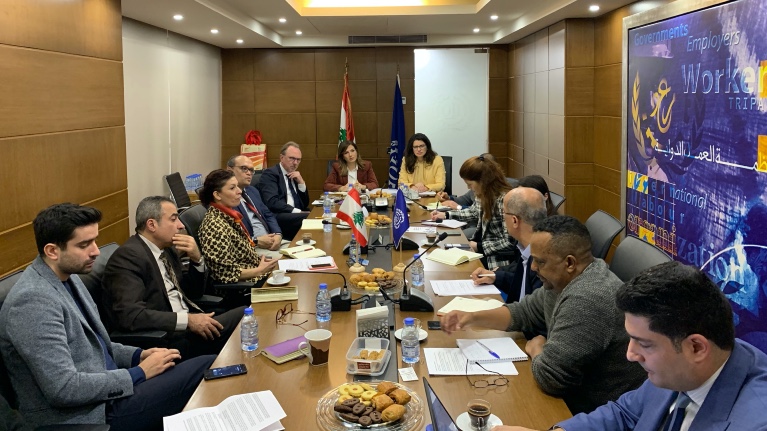ILO Regional Director Jaradat welcomes Lebanon’s Minister of Labour Yammine at the ILO’s regional headquarters
The visit was the first by the newly-appointed minister to the ILO Regional Office for Arab States in Beirut.

BEIRUT (ILO News) - ILO Regional Director for Arab states Ruba Jaradat and ILO technical specialists and project managers welcomed newly-appointed Lebanese Minister of Labour Lamia Yammine and her delegation at the ILO Regional Office in Beirut, to discuss ways forward in jointly addressing labour market issues in the country.
Discussions in Friday’s meeting focused on ongoing work by the ILO and Lebanon’s Government and employer and worker organizations to reform the Labour Law, promote employment creation, expand and increase social protection coverage, and reform the “kafala” visa-sponsorship system that governs migrant labour in Lebanon and much of the Middle East. The meeting also broached joint progress and future plans in the areas of technical and vocational education and training, skills development, combatting child labour, promoting gender equality in the workplace, and developing Lebanon’s labour inspection capacities.
Lebanon and the ILO are currently implementing the country’s first Decent Work Country Programme (2017-2020), which was developed jointly by the ILO and Lebanon’s Government and worker and employer representatives. The Programme works to improve labour governance in accordance with International Labour standards, create productive employment opportunities with focus on Lebanese youth employment, and expand and increase social security with a focus on the vulnerable groups of society.
The ILO’s Regional Office recently provided technical support to Lebanon’s Central Administration of Statistics in conducting the country’s largest specialized labour force and household living conditions survey, with funding from the European Union (EU).
The ILO also worked with the United Nations Children’s Fund (UNICEF) and the Government of Lebanon to develop a national strategic framework to upgrade Lebanon’s technical and vocational education and training (TVET) system, with the aim of increasing youth employment and boosting the labour market and wider national economy. The Technical and Vocational Education and Training National Strategic Framework 2018-2022 was launched in June 2018.
The ILO is supporting Lebanon in responding to the Syria refugee crisis by contributing to Lebanon’s stability through expanding economic opportunities to the most vulnerable local communities. Work includes an employment intensive infrastructure programme (EIIP), funded by the Government of Germany, which builds infrastructure and creates decent work opportunities in areas hosting large numbers of refugees. The refugee crisis response also includes strengthening Lebanon’s institutions and coordination mechanisms to combat unacceptable forms of work.
The ILO is implementing a portfolio of development cooperation projects in Lebanon to the value of around US$41.7 million. Development partners include the governments of Germany, the Netherlands and Norway, the EU, the Food and Agriculture Organization of the UN, the Ford Foundation and UNICEF. The projects address a range of issues from skills development, employment intensive investment, and social security to child labour, labour law review and domestic workers.
Lebanon has been an ILO member state since 1948, five years after the country declared independence. It has ratified 50 ILO Conventions, including seven of the eight fundamental conventions, which address key human rights issues. Lebanon’s capital Beirut has been home to the ILO’s Regional Office for the Arab States since 1976.